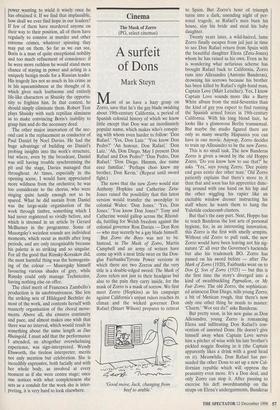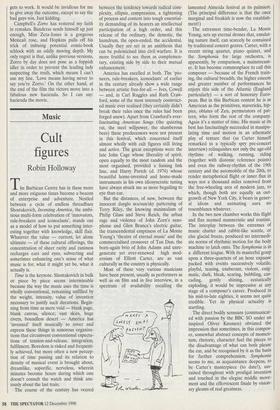Cinema
The Mask of Zorro (PG, select cinemas)
A surfeit of Dons
Mark Steyn
Most of us have a hazy grasp on Zorro, save that he's the gay blade swishing about 19th-century California, a period of Spanish colonial history of which we know little except that Don was an inordinately popular name, which makes who's conspir- ing with whom even harder to follow: Don Rafael."Yes, Don Luiz."You know Don Pedro?' An honour, Don Rafael.' Don Luiz."Ah, Don Diego. May I present Don Rafael and Don Pedro?' Don Pedro, Don Rafael.' Don Diego. Hmmm, dee name eeez familiar.' Perhaps choo knew my brother, Don Kevin.' (Repeat until sword fight.) The news that the new Zotro would star Anthony Hopkins and Catherine Zeta- Jones raised the possibility that this latest version would transfer the swordplay to colonial Wales: Don Jones."Yes, Don Jones.' You know Don Jones?' Tony and Catherine would gallop across the Rhond- da, battling for Welsh freedom against the colonial governor Ron Davies — Don Ron — who may secretly be a gay blade himself.
But Zorro the Boyo was not to be. Instead, in The Mask of Zorro, Martin Campbell and an army of writers have come up with a neat little twist on the Dou- glas Fairbanks/Tyrone Power versions in which there are two Zorros and the very title is a double-edged sword: The Mask of Zorro refers not just to their headgear but also to the pain they carry inside, for the mask of Zorro is a mask of sorrow. We first meet Zorro (Hopkins) as his campaign against California's unjust rulers reaches its climax and the wicked governor Don Rafael (Stuart Wilson) prepares to retreat `Good move, Jack, changing from beef to arable.' to Spain. But Zorro's hour of triumph turns into a dark, unending night of per- sonal tragedy, as Rafael's men burn his house, slay his bride and steal his baby daughter.
Twenty years later, a wild-haired, lame Zorro finally escapes from jail just in time to see Don Rafael return from Spain with the beautiful daughter Elena (Zeta-Jones) whom he has raised as his own. Even as he is wondering what nefarious scheme has brought Rafael back to California, Zorro runs into Allesandro (Antonio Banderas), drowning his sorrows because his brother has been killed by Rafael's right-hand man, Captain Love (Matt Letscher). Yes, I know Captain Love sounds more like a Barry White album from the mid-Seventies than the kind of guy you expect to fmd running the Spanish armed forces in 19th-century California. With his long blond hair, he looks like a glamorous Berlin transsexual. But maybe the studio figured there are only so many swarthy Hispanics you can have in one movie. Anyway, Zorro decides to train up Allesandro to be the new Zorro.
This is no small task. The new Banderas Zorro is given a sword by the old Hoppo Zorro. 'Do you know how to use that?' he asks. 'Yes,' says young Zorro. Dee pointy end goes eento dee other man.' Old Zorro patiently explains that there's more to it than that and soon has his apprentice danc- ing around with one hand on his hip and the other wiggling his rapier like an excitable window dresser instructing his staff where he wants them to hang the Yuletide cockscomb clusters.
But that's the easy part. Next, Hoppo has to teach Banderas the lost arts of personal hygiene, for, in an interesting innovation, this Zorro is the first with smelly armpits. Without old Zorro to pull rank, the new Zorro would have been leaving not his sig- nature 'Z' all over the Governor's hacienda but also his trademark BO. Zorro has passed on his sword before — after The Mark of Zorro (1920), Fairbanks went on to Don Q, Son of Zorro (1925) — but this is the first time the story's diverged into a kind of swashbuckling Pygmalion, or My Fair Zorro. The old Zorro, the sophisticat- ed aristocrat Don Diego, tells young Zorro, a bit of Mexican rough, that there's now only one other thing he needs to master: `Charm.' Wot eez da?' asks Banderas.
But pretty soon, in his new guise as Don Allesandro, young Zorro is romancing Elena and infiltrating Don Rafael's con- vention of assorted Dons. He doesn't give himself away when Captain Love serves him a pitcher of wine with his late brother's pickled noggin floating in it (the Captain apparently likes a drink with a good head on it). Meanwhile, Don Rafael has per- suaded the other Dons to set up a new Cal- ifornian republic which will oppress the peasantry even more. It's a Don deal, and only Zorro can stop it. After pausing to exercise his deft swordmanship on the straps on Elena's undergarments, Banderas gets to work. It would be invidious for me to give away the outcome, except to say the bad guys win. Just kidding.
Campbell's Zorro has restored my faith in remakes. Banderas sends himself up just enough, Miss Zeta-Jones is a gorgeous Mexicali rose, and Hopkins pulls off his trick of imbuing potential comic-book schlock with an oddly moving depth. My only regret is that, unlike previous versions, Zorro by day does not pose as a foppish idler in order to prevent the leading lady suspecting the truth, which means I can't use my line, 'Love means having never to say you're Zorro.' On the other hand, at the end of the film the victors move into a fabulous new hacienda. So I can say: hacienda the movie.











































































 Previous page
Previous page